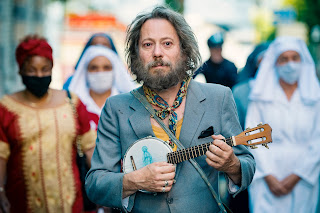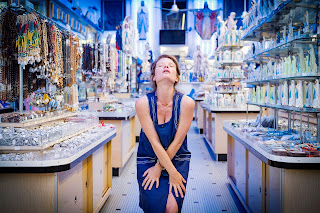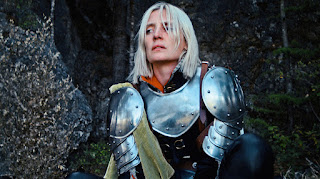Tralala marks the fifth collaboration between Mathieu Amalric and the Larrieu brothers, and it is now almost twenty years since their first film together, the medium-length A Real Man. Amalric is one of several performers favoured by the Larrieus, with the likes of Karin Viard, Sergi Lopez and Maïwenn all making multiple appearances for the brothers, although it is only the last of this trio who appears alongside Amalric in Tralala . The most recent Larrieus film to feature Amalric (or Maïwenn, for that matter) was 2013's Love is the Perfect Crime, which may just be the brothers' best work. Between that film and Tralala, the duo directed 21 Nights with Pattie, a tonally uncertain yet largely enjoyable work that featured a strong leading performance by the excellent Isabelle Carré, an actress who, despite appearing to be a good fit for the Larrieus' sensibilities, has yet to make another film with the brothers.
In addition to his glittering career as an actor and his status as the go-to guy for both Arnaud Desplechin and the Larrieus, Mathieu Amalric has carved out a formidable reputation on the other side of the camera—his most recent directorial effort, Hold Me Tight, can be currently seen alongside Tralala at the International Film Festival Rotterdam (Amalric also participated in one of the festival's Big Talks). As the title character in Tralala, Amalric gives the sort of performance familiar to his devotees, with the raffish charm he exudes going a long way towards carrying a story that is sometimes rather thin, yet never anything less than entertaining. Amalric is backed by a fine supporting cast: in addition to the aforementioned Maïwenn, Tralala features enjoyable turns from Josiane Balasko, Denis Lavant, Jalil Lespert and Galatéa Bellugi; although a relative unknown among the starry, experienced cast, Bellugi manages to quietly steal almost every scene she's in.
Amalric's Tralala is a penniless busker who lives in a tiny city apartment that has no basic amenities; what's worse, the building stands on the brink of demolition, and Tralala needs to have a serious think about his options, such as they are. After a day of busking in the city centre, Tralala encounters an attractive young woman (Bellugi), and the two go for a drink at a bar; the woman goes to pay the tab but doesn't come back, and the waiter returns to hand Tralala the not inconsiderable change. Greatly intrigued by this mysterious stranger, Tralala has few clues about who she is, although a lighter she's left behind seems to be a souvenir from Lourdes. Tralala uses the money he's just acquired to make his way to the city of miracles, where he attempts to track down the young woman; after a fruitless, exhausting first day in which he loses his guitar (thanks to Lavant's aggressive fellow busker, who doesn't take kindly to others working his patch), Tralala finds refuge in a flophouse owned by Lili (Balasko), who mistakes Tralala for Pat, her musician son who left Lourdes many years ago and hasn't been heard from since.
As a man with little to lose, Tralala decides to go along with this, and from this point on he steps into Pat's shoes. While Lili is adamant that this is her son, others are less than convinced, and in this sense the film recalls the basic conceit of the otherwise completely different Titane. Still, Tralala does his best to make a go of it as an ersatz Pat, although this means negotiating tricky encounters with his subject's old flames Jeannie (Mélanie Thierry) and Barbara (Maïwenn), the latter of whom has a very close connection to the person who lured Tralala to Lourdes. As the enquiries made by Tralala regarding the young woman have largely been met with hostility, this only serves to deepen the mystery surrounding this ethereal character, the memory of whom continues to haunt Tralala even as he's busy juggling the various components of his complex new identity. Amalric, that most dependable of screen presences, always does enough to keep the sheer preposterousness of the scenario at bay, even if this diverting confection does not represent the Larrieu brothers at their very best. But as with its title character, Tralala nonetheless possesses a ramshackle charm.
Darren Arnold
Images: Pyramide Films









